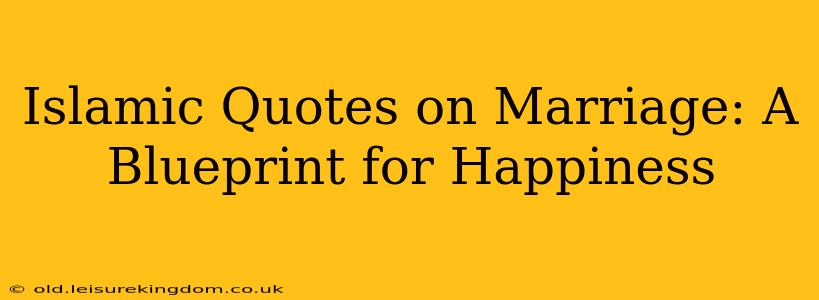Marriage, in Islam, is considered a sacred bond, a partnership ordained by God to foster love, compassion, and mutual growth. Far from being merely a social contract, it's a path toward spiritual fulfillment, reflecting the divine relationship between God and His creation. Islamic teachings offer profound insights into building a strong and happy marriage, providing a blueprint for navigating the joys and challenges of this sacred journey. This article explores several key Islamic quotes on marriage, examining their meanings and practical applications in modern life.
What are some of the most important Islamic teachings on marriage?
Islamic teachings on marriage emphasize mutual respect, compassion, and shared responsibility. The Quran and the Sunnah (the Prophet Muhammad's teachings and practices) highlight the importance of choosing a spouse wisely, maintaining open communication, and prioritizing kindness and understanding. These teachings aim to create a stable and nurturing environment for both partners and their future family. The concept of sakinah – tranquility and peace – is central to a successful Islamic marriage.
What does the Quran say about a good husband?
The Quran doesn't explicitly list attributes of a "good husband" in a checklist, but it emphasizes qualities that are essential for a successful marriage. These include:
-
Kindness and compassion: The Quran repeatedly stresses the importance of rahma (mercy and compassion) in all aspects of life, including marriage. A good husband treats his wife with kindness, empathy, and understanding. He avoids harshness and strives to create a loving and supportive environment.
-
Justice and fairness: Islam emphasizes fairness and justice in all relationships. A good husband treats his wife justly, sharing responsibilities equitably and avoiding favoritism.
-
Provision and financial responsibility: While not solely the husband's burden, providing for the family's needs financially is a significant responsibility. This is interpreted not just as material provision but also emotional and spiritual support.
-
Patience and forgiveness: Marriage inevitably presents challenges. A good husband displays patience and forgiveness, understanding that mistakes are part of human nature.
What does the Quran say about a good wife?
Similar to the qualities expected of a husband, the Quran doesn't offer a direct list but emphasizes:
-
Obedience and loyalty: This obedience, however, is not blind subservience but rather a respectful adherence to the principles of Islam and mutual agreement within the marriage.
-
Respect and honor: A good wife respects her husband, honoring his position within the family and striving to create a harmonious home.
-
Maintaining the home: This encompasses not only the physical upkeep but also creating a welcoming and emotionally nurturing space for her husband and family.
-
Loyalty and fidelity: Faithfulness and commitment are paramount in an Islamic marriage.
What are some famous Islamic quotes about marriage?
While there isn't a single definitive list of "famous" quotes, several Hadith (sayings and traditions of the Prophet Muhammad) offer invaluable guidance:
-
"The best of you are those who are best to their wives." This Hadith underscores the importance of treating one's wife with kindness and respect.
-
"When a man looks at his wife, and she looks at him, Allah increases their love." This highlights the importance of mutual affection and appreciation in strengthening the marital bond.
How can Islamic principles improve a marriage?
Applying Islamic principles can significantly improve a marriage by:
-
Promoting communication: Open and honest communication, based on respect and empathy, is crucial. Islam encourages resolving conflicts peacefully and through dialogue.
-
Strengthening the spiritual connection: Shared prayer, studying religious texts together, and engaging in acts of worship can deepen the spiritual bond between spouses.
-
Building a strong foundation: Islamic teachings provide a moral and ethical framework, guiding couples in making decisions based on faith and values.
-
Fostering forgiveness and reconciliation: Islamic teachings on forgiveness and repentance can help couples overcome conflicts and rebuild their relationship.
What are some common challenges in Muslim marriages today?
Modern Muslim marriages face challenges similar to those in other communities, including:
-
Cultural differences: Marriages between individuals from different cultural backgrounds may face unique challenges related to traditions and expectations.
-
Modern lifestyles: The demands of modern life, such as work pressures and financial concerns, can strain marital relationships.
-
Lack of communication: Poor communication can lead to misunderstandings and conflicts.
-
Balancing family and career: Finding a balance between work and family life can be challenging for both spouses.
By adhering to the core principles of Islam—compassion, respect, justice, and forgiveness—Muslim couples can overcome these challenges and build a strong, happy, and fulfilling marriage that reflects the divine blessings of this sacred union. The journey requires constant effort, understanding, and a shared commitment to nurturing the bond, guided by the wisdom of the Quran and the Sunnah.

